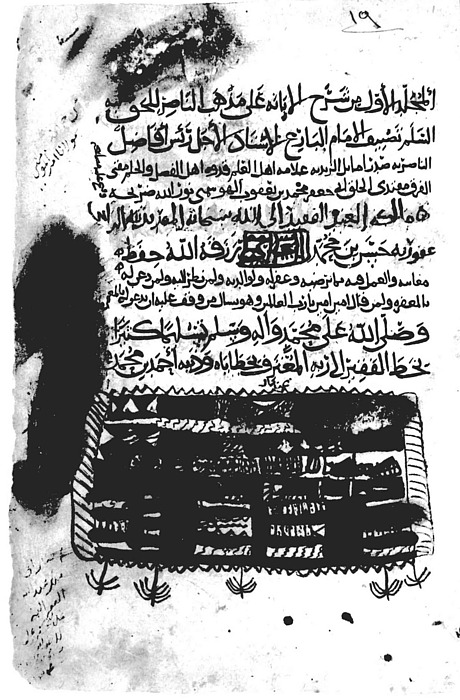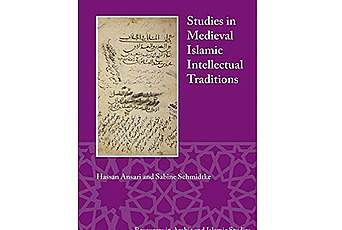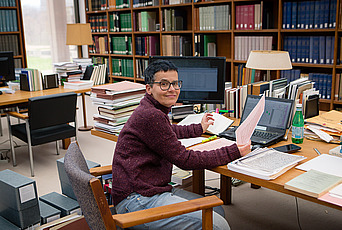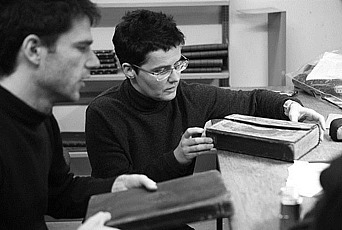Institute Scholars Receive Persian Heritage Foundation Grant to Study Zaydism in Iran
Press Contact

The Institute for Advanced Study (IAS) in conjunction with the Persian Heritage Foundation (PHF) announce the award of a PHF grant to support the study of Zaydism in Iran—part of a major research project spearheaded by Sabine Schmidtke, Professor in the IAS School of Historical Studies.
Over the years, Schmidtke’s research has unearthed a rich collection of Zaydi doctrinal thought and legal history that had previously been neglected. While Zaydi Shiism is commonly associated with the highlands of Yemen, next to nothing is known about the Zaydi community in Northern Iran between the ninth and the sixteenth century.
“It is my hope,” says Schmidtke, “that our work will help to develop a new field of study and to inspire a new generation of scholars to work on this material.”
From the ninth through the late twelfth century, the leading intellectual centers of Zaydism were located in Northern Iran. Gradually, the Zaydi communities in Iran experienced a decline and most of their literary legacy was no longer transmitted. Had it not been for the massive transfer of Zaydi religious literature from Iran to Yemen following the political unification of the Caspian and Yemeni Zaydis that began by the end of the eleventh century, most of the Iranian Zaydi literary heritage would have been lost. However, the tradition of Zaydi learning continued in Iran at least until the sixteenth century, as is confirmed by scattered documents attesting the scholarly tradition of Zaydism.
“The Persian Heritage Foundation supports research initiatives to advance our understanding of new and understudied fields of inquiry relating to all aspects of the Persian heritage and its history,” stated Rudi Matthee, President of PHF. “We are pleased to support this important initiative, confident that the result of the research will substantially increase our knowledge of the little-known Zaydi tradition of Northern Iran and its subsequent transmission to Yemen.”
The generous grant will be used to fill in the gaps in understanding of this history, focusing on key figures and their works among the Iranian Zaydis. Most importantly, it will help to finalize a monograph which is currently being prepared by long-term Member at IAS Hassan Ansari and Sabine Schmidtke: Studies in Iranian Zaydism: An Intellectual History from the 11th to the 16th Century, accepted for publication by Edinburgh University Press (forthcoming in 2021). In this book some of the key figures of Iranian Zaydism between the eleventh and thirteenth centuries and their literary productions will be analyzed, including the eleventh-century Imam al-Muwaffaq bi-llāh and his son al-Murshad bi-llāh, as well as the two twelfth-century scholars, Abū l-ʿAbbās Aḥmad b. Muḥammad al-Sammān, author of a comprehensive exegesis of the Qurʾān, and ʿAlī b. al-Ḥusayn Siyāh Sarbījān, the author of the influential K. al-Muḥīṭ fī l-imāma, a comprehensive account of Zaydi political theory. In addition, some of the remnants of Zaydi scholarship in Iran beyond the 13th century will be discussed, including scholarly contacts between Yemenis and Iranians during the 19th and 20th centuries.
Sabine Schmidtke was appointed Professor of Islamic Intellectual History in the School of Historical Studies in 2014 and was previously a Member of the School in 2008–09 and 2013–14. Her pioneering research has transformed perspectives on the interrelations and connections among different strands of intellectual inquiry, across time, place, religions, and philosophical schools. She has played a central role in the exploration of heretofore unedited and unknown theological and philosophical writings. Schmidtke has applied rigorous standards to the edition and critical analysis of manuscripts in Arabic, Judeo-Arabic, and Persian, and her work extends from Arabic-speaking countries to Iran, Israel, Russia, and Turkey.
About the Persian Heritage Foundation
The Persian Heritage Foundation (PHF), originally called The Yarshater Fund, is a U.S.-registered, non-political, non-governmental organization. Established in 1983 through the efforts of Professor Ehsan Yarshater, PHF aims to support and promote research on all aspects of the Persianate world in the pre-Islamic as well as the Islamic period—a world that is not confined to the present boundaries of Iran, but that extends to Central Asia, the Caucasus, the Indian Subcontinent and, more recently, the wider Iranian diaspora, involving a multitude of languages, religions and cultures.
About the Institute
The Institute for Advanced Study is one of the world's foremost centers for theoretical research and intellectual inquiry. Located in Princeton, N.J., the IAS is dedicated to independent study across the sciences and humanities. Founded in 1930 with the motto "Truth and Beauty," the Institute is devoted to advancing the frontiers of knowledge without concern for immediate application. From founding IAS Professor Albert Einstein to the foremost thinkers of today, the IAS enables bold, nonconformist, field-leading research that provides long-term utility and new technologies, leading to innovation and enrichment of society in unexpected ways.
Each year, the Institute welcomes more than 200 of the world’s most promising researchers and scholars who are selected and mentored by a permanent Faculty, each of whom are preeminent leaders in their fields. Of the Institute’s current Faculty of twenty-six, two are Fields Medalists and five are MacArthur “Genius” Fellows. Comprised of four Schools—Historical Studies, Mathematics, Natural Sciences, and Social Science—IAS has produced an astounding record of introducing new understanding and is responsible for undeniable progress across disciplines and generations, from the development of one of the first stored-program computers to the establishment of art history as a discipline in the United States. Among its present and past Faculty and Members are 34 Nobel Laureates, 42 of the 60 Fields Medalists, and 18 of the 20 Abel Prize Laureates, as well as many MacArthur Fellows and Wolf Prize winners.


